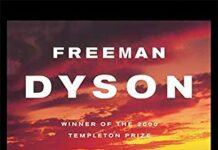
Ebook Info
- Published: 1998
- Number of pages: 224 pages
- Format: PDF
- File Size: 12.52 MB
- Authors: Freeman Dyson
Description
Imagine a world where whole epochs will pass, cultures rise and fall, between a telephone call and the reply. Think of the human race multiplying 500-million fold, or evolving new, distinct species. Consider the technology of space colonization, computer-assisted reproduction, the “Martian potato.” One hundred years after H. G. Wells visited the future in The Time Machine, Freeman Dyson marshals his uncommon gifts as a scientist and storyteller to take us once more to that ever-closer, ever-receding time to come.Since Disturbing the Universe, the book that first brought him international renown, Freeman Dyson has been helping us see ourselves and our world from a scientist’s point of view. In Imagined Worlds he brings this perspective to a speculative future to show us where science and technology, real and imagined, may be taking us. The stories he tells―about “Napoleonic” versus “Tolstoyan” styles of doing science; the coming era of radioneurology and radiotelepathy; the works of writers from Aldous Huxley to Michael Crichton to William Blake; Samuel Gompers and the American labor movement―come from science, science fiction, and history. Sharing in the joy and gloom of these sources, Dyson seeks out the lessons we must learn from all three if we are to understand our future and guide it in hopeful directions.Whether looking at the Gaia theory or the future of nuclear weapons, science fiction or the dangers of “science worship,” seagoing kayaks or the Pluto Express, Dyson is concerned with ethics, with how we might mitigate the evil consequences of technology and enhance the good. At the heart of it all is the belief once expressed by the biologist J. B. S. Haldane, that progress in science will bring enormous confusion and misery to humankind unless it is accompanied by progress in ethics.
User’s Reviews
Editorial Reviews: Review “This is an extraordinary book, written in the wisdom of old age but with the hopeful courage of a man whose commitment to science, if not necessarily to its products, has kept him young.”―The New Yorker“Imagined Worlds makes illuminating criticisms of what [Dyson] calls ‘ideologically driven’ technologies, which, because they symbolize national pride, are obliged to succeed…Ideologically driven technologies, Dyson argues, discourage the rigorous experimentation without which no technology can properly evolve.”―Timothy Ferris, New York Review of Books“Freeman Dyson is one of the last survivors of the heroic age of theoretical physics and contributed greatly to the standard theory of quantum electrodynamics. However…he does not suffer from tunnel vision. His imagination embraces the entire cosmos and all the possibilities of future technology…Imagined Worlds is one of those mind-stretching books that any intelligent reader can enjoy.”―Arthur C. Clarke, Times Higher Education Supplement“Dyson has a startlingly profound imagination, a willingness to take ideas as far as they can possibly go…In this book he provides a fascinatingly plausible view of artificial telepathy. He has helped to design extraordinary spaceships and advised the Pentagon on wild (and no doubt occasionally woolly) weapons. Best of all, from the science-fiction writer’s point of view, he admires science-fiction writers. This book is, in part, a tribute to science-fiction; it is an attempt not to predict the future, but rather, through imagination, to bring some of its potential to life.”―Oliver Morton, Nature“In his new volume, Imagined Worlds, Freeman Dyson, following in the tradition of two of his heroes, novelist H. G. Wells and biologist J. B. S. Haldane, gives us a cautionary vision of where science and technology are taking us in the next century…Dyson’s book is a fascinating romp through possible futures.”―Steven J. Dick, Natural History“[A] remarkable book.”―John Leslie, London Review of Books“Dyson, not just a distinguished scientist, but a fine writer about science…has produced a fascinating speculative work about future scientific developments–near- and far-future–and their likely impact on us.”―Toronto Globe & Mail“[Dyson] constantly surprises and challenges us with his views…[His] independence of mind and his learning make his views on the future well worth reading. At first sight, Imagined Worlds may seem thin and insubstantial, but it actually contains more rewarding insights than most books 10 times its length.”―Graham Farmelo, Sunday Telegraph“[A] marvellous little book.”―Tim Radford, The Guardian (Manchester, England)“One of the books I enjoyed most last year…was Freeman Dyson’s Imagined Worlds, in which the famed Princeton scientist speculated on the likely evolution of humanity over the next 10, 100, 1,000 10,000, 100,000 and 1 million years…Imagined Worlds…deserves to be read for its elegance and sagacity.”―Michael Thompson-Noel, Financial Times [UK]“As well as mind-boggling speculations [on our future], Imagined Worlds includes some good discussions of how science and technology relate to politics and ethics…The future? Freeman Dyson has it figured out.”―Rudy Rucker, Washington Post Book World“A leading scientist speculates on far-future scientific developments and their possible impact on the human condition. Dyson points out that our culture has apparently lost its long-range vision. Drawing on a fascinating cross-section of scientific and technological history, the professor emeritus at Princeton’s Institute for Advanced Study lays the groundwork for a longer view…At every turn, he illustrates his subject with reference to a wide range of writers and philosophers, making the book a delight to read. Essential reading for anyone who looks beyond the coming millennium.”―Kirkus Reviews“Thanks to new technologies, researchers can see much farther into the galaxies, much deeper into the genetic structure of life, and more clearly into the heart of the atom than ever before. But envisioning our cultural future still requires the kind of probing, reflective human imagination we see at work in these pages. As this distinguished scientist contemplates a world in which genetic engineers create superbabies and pet dinosaurs, in which space colonies raise potatoes on Mars, in which radiotelepathy allows humans to communicate with dolphins and eagles, he weighs fear against hope…With a rare breadth of literary and historical knowledge and with a wonderful lucidity of style, Dyson converts science from the intellectual property of specialists into a meaningful concern for everyone with a stake in our cultural future.”―Booklist“[I]ntriguing and readable.”―Library Journal“Freeman Dyson is an expert rambler. Four or five digressions into an essay, just as you think he’s lost his trail, he finds it again around the next bend…[He] describes himself as a ‘problem solver,’ drawn butterfly-like to nuclear energy, rocket propulsion, quantum electrodynamics, and astronomy, among other fields. This propensity serves his readers well. Dyson is not merely a scientist who can write but a scientist who thinks like a writer. In Imagined Worlds, he trains his thoughts on the world that science and technology are creating, showing how ‘Tolstoyan science’ (small and cheap) is preferable to ‘Napoleonic science’ (big and expensive).”―Discover“Freeman Dyson…[is] brilliant and admirable: a physicist (now retired) of considerable accomplishment and a storyteller of delightful humanity and skill.”―Philip Gold, Washington Times“The world needs the kind of wisdom that Freeman Dyson has accumulated after a lifetime of theoretical physics at Cambridge and Princeton, and his contributions to the nuclear test ban treaty.”―Colin Tudge, New Statesman“One of the more daring theories in today’s cosmology is that at the creation of our universe an infinite number of others were also brought into being, but that none can communicate with any other. Be that as it may, whenever I am in the presence of Freeman Dyson, a physicist and professor emeritus at the Institute for Advanced Studies in Princeton, I have the uncanny feeling that he is able, after all, to look around the corner into some of those other worlds from which we are cut off. Dyson claims to be a mathematical physicist interested in anatomy. But from his many writings, we know better. He is interested in any question whatever that might have a scientific solution, and in any imaginative idea that may help to anticipate the future…[E]ven while readers will disagree with this or that point, they will also most likely be swept up by the ambitious scope of the book, and Dyson’s unwavering belief that our benighted species can improve.”―Gerald Holton, Boston Sunday Globe“[A]n engaging work that combines science (`my territory’) and science fiction (‘the landscape of my dreams’). Dyson ponders the triumphs and failures of scientists, using real and imagined stories–from the ill-fated Comet jetliner of 1952 to the technological nightmares of H.G. Wells and Huxley–to illustrate the dangers that surface when political ideology and science mix…Mostly this is a reminder that human consequences and human scale must be considered in the application of science and technology…Dyson’s use of science fiction to illustrate and evaluate scientific fact is a refreshing and illuminating tool.”―Publishers Weekly“Freeman Dyson is one of the true geniuses of our age. His latest book, full of wry wit and profound wisdom, will be of absorbing interest to anyone concerned with the future happiness, and indeed survival, of the human race.”―Arthur C. Clarke“Broadly knowledgeable, thoughtful, and wise, Freeman Dyson the humanist and physicist outlines here futures for the scientific enterprise–ten, one hundred, ten thousand, and a million years from now. Although not a fan of futurology, I found Imagined Worlds fascinating.”―Lynn Margulis“Freeman Dyson’s Imagined Worlds confirms his reputation as one of the world’s clearest and most sagacious critics of science and technology–and it’s a delight to read as well.”―Timothy Ferris About the Author Freeman Dyson is Professor Emeritus in the School of Natural Sciences, Institute for Advanced Study, Princeton.
Reviews from Amazon users which were colected at the time this book was published on the website:
⭐Book came in excellent condition.
⭐Excellent Item and Fast Shipping! Thanks!
⭐Delivered on time. Met expectations.
⭐Perfect.
⭐Freeman Dyson initially misleads us with his title, “Imagined Worlds”. He doesn’t give us a grand science-fiction masterpiece with illustrious water worlds, or stifling desert planets with nomadic aliens. Rather, he elaborates on humanity’s successes and shortcomings in science, technology, evolution, ethics. He delves into humankind’s past, analyzing our world’s scientific history, and offers us multitudes of possibilities for our race’s future on Earth, in the solar system, and across the vast stretches of our own Milky Way.Like any other scientist, Dyson is electrified by the rapid evolution of modern technology. However, he takes care to offer us a solemn warning: technological progress without adequate social progress can lead to poverty over prosperity. Inventions and technologies designed for profit instead of practicality favor the rich and neglect the poor, creating an ever-growing gap between classes. This separation of people leads to friction, conflict, revolution–actions which start the process over again. Necessary measures toward ensuring the prosperity of our species must be taken by having an ethical approach toward scientific progress: developing cheap technologies to help those in need rather than creating elaborate toys for the wealthy.Dyson explains that, even if these set of ethics can be maintained, other obstacles would still exist to limit our capacity for progress. People’s traditional and long-held beliefs may philosophically clash with the direction of scientific development and evolution, slowing the advancement due to moral opposition to the nature of the work itself. Given the invention has a certain degree of practicality and necessity, it will certainly overcome the moral barriers people will present. However, he concludes, the process will be needlessly long and tiresome.Dyson’s implications for the future of life here on Earth and his proposed futures certainly make one consider which direction of progress and achievement would be the most favorable. His tone and writing skills make his presentation of his already thought-provoking suggestions that much more appealing. The ideas presented can often be seemingly jumbled and random, which occasionally disturbs the flow; however, overall it brings numerous examples in a fashion everyone can be comfortable with. He has crafted a genuinely enjoyable, readable, and balanced work which is perfect for students and scholars alike. Anyone could–and should–take the time to read this book and consider where the path of our existence leads.No one knows what the future will be like, but Dyson suggests you go discover it yourself.
⭐The most engaging scientific writers (personal favorites include E.O. Wilson, Primo Levi, and Roald Hoffman) are not only masterly at sharing their field of study with you, but also enrich it with broader connections to art, history, and literature. Dyson does the same in Imagined Worlds, a collection of essays based on his lectures from the 1995 Jerusalem Harvard series. In it he explores the interplay of science, technology, and human evolution, as well as their futures and the important role ethics plays in relation to them. Along the way he speculates on everything from radiotelepathy and genetically engineered pets to Martian potatoes, which makes for some imaginative (and prescient) reading.Dyson opens with a short story about his uncle, a German doctor whose greatest loves were his house and garden, which he lived in and kept throughout his entire life. He witnessed numerous political powers come and go, from the imperial to the communist, and developed a long term perspective of things, illustrated by his decision to cut down a magnificent oak tree in his garden. Dyson recalls how this decision shocked him – the tree looks healthy. He then learns that it is actually past its prime, and his uncle is thinking ahead for the sake of his grandchildren, who will inherit the house. He must kill the tree and plant a new sapling because “That tree would last my time, but it would not last theirs. I will plant a tree that they will enjoy when they are as old as I am now.” The message? Look beyond the here and now. Consider the future. Dyson takes a similar long view in his writing.The chapters on science and technology explore how each progresses, and how they have (and will) in turn change our world, for good and for bad. Technological evolution is a Darwinian process, Dyson writes, where inventions driven by practicality are more likely to survive than those pushed by ideology, which are almost always doomed. He illustrates this with a fascinating story of early 20th century aviation. Its empire in decline, Great Britain attempted to regain its former glory with impressive airships like the R101 and jetliners like the BOAC Comet. Political motivations and timetables dictated their development, however, and the new inventions were pushed into use untested. The predictable results when the politicians do the thinking instead of the engineers, when designing things meant to fly at high altitudes and great velocities: devastating crashes and tragic deaths.He presents other similar ideologically driven cases, and his comments on nuclear power in particular call to mind the recent bailouts of the Detriot automakers and financial institutions deemed too big to fail: “There is nothing wrong…with using nuclear energy…But the rules of the game must be fair, so that nuclear energy competes with other sources of energy and is allowed to fail if it does badly…But the characteristic feature of an ideologically driven technology is that it is not allowed to fail.” It also makes you wonder how the push for green energy here in America will pan out.Dyson highlights a central message throughout Worlds- the disruptive power of technology must be tempered by ethics if we are to progress as a species. Early in the book he invokes H.G. Wells’ The Time Machine as a cautionary tale where technology, unchecked by any ethical guidance, has not only widened the gap between rich and poor, but sent them down drastically divergent evolutionary paths. The results are the dehumanized, monstrous Morlocks and their prey the helpless, indolent Eloi. It’s a lose-lose situation for everyone. Later, he echoes J.B.S. Haldane, who argued that technology tends to “change good to evil”. When Dyson starts to explore the potential for genetic engineering (biology will be the 21st century’s parallel to 20th century physics, he predicts) and considers how technology could shape human evolution, you start to consider how important a.The final chapter, “Ethics”, begins with a message from Samuel Gompers, the father of the American Labor movement: “We want more schools and less jails, more books and less guns, more learning and less vice, more leisure and less greed, more justice and less revenge, we want more opportunities to cultivate our better nature.” If we can meet these needs through technology, Dyson writes, we can all prosper. If not, if technology benefits only the privileged, widening the existing gaps, the inevitable repercussions will harm all of us. In the end, “Worlds” seems to be more about us, and what we do with science, than just science itself. As we acquire more and more control over our destiny as a species through technology, how we steer our course becomes more and more important.I highly recommend the book. Dyson is knowledgeable, conversational, and thought-provoking as he invites us to consider where we have been as a species, where we are right now, and where we are going.
Keywords
Free Download Imagined Worlds (The Jerusalem-Harvard Lectures) in PDF format
Imagined Worlds (The Jerusalem-Harvard Lectures) PDF Free Download
Download Imagined Worlds (The Jerusalem-Harvard Lectures) 1998 PDF Free
Imagined Worlds (The Jerusalem-Harvard Lectures) 1998 PDF Free Download
Download Imagined Worlds (The Jerusalem-Harvard Lectures) PDF
Free Download Ebook Imagined Worlds (The Jerusalem-Harvard Lectures)




